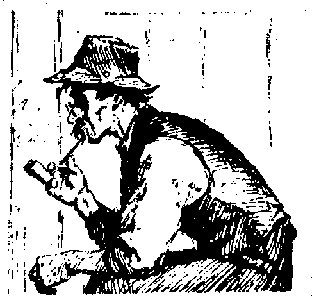
Storekeep, Mrs. Storekeep, Cityfella — who was beginning to spend more than his usual amount of time in the store, leading Mrs. Storekeep to suspect that problems were mounting on his home-front, especially because Mrs. Cityfella (her name was Irene) had not been in for a month or more — and Curmudgeon, were checking the headlines on the Asheville paper, headlines that dealt with the continuing defabrication of politics in Raleigh.
“Boy,” said Curmudgeon, “the Democrats held power in the state for over 100 years and it took a combined effort of public ignorance, public distain, and the public deciding that they knew better — by staying at home for the last election — and now look!”
“Don’t forget,” said Storekeep, “that Republican gerrymandering played a big part, too.”
“Republicans are generally more consumed with self interest than the rest of the voters. They are a bit like crows circling the territory, looking for sparkling items to pick up and steal.”
“Sparkling items?” asked Mrs. Storekeep.
“Crows,” answered Curmudgeon, “because they simply love shining and sparkling things. They take them home to decorate their nests, much like people buy garage-sale portraits of Elvis Presley done in black velvet with stitched on sequins.
“And don’t forget that crows are very well-known birds — not very popular but very well known, and that includes the number of times crows are mentioned in common words that we use every day. There’s the carpenters’ crow bar, to yellow crow-bells being a common name for daffodils, to our aging eyes being ringed with crow’s feet, to one used crow-quill — originally being the feathers of crows having a sharpened tip and used in penmanship, to the obsolete name of that wildflower, the soapwort — ”
“Yes,” said Mrs. Storekeep — who was the leader of the local garden club, “I remember that bouncing bet or Saponaria, was once called the crowsoap plant — ”
“ — to the flight,” continued Curmudgeon, “of a crow to the crow’s nest of whaling ships.”
“I hate to jump in here,” said Storekeep, “but I always thought of crows as being great and noble birds.”
“They are,” answered Curmudgeon, “I meant no respect to the species but merely pointed out their having a particular love of shiny things.”
“In the name of polite responses could we talk a bit less about politics and a bit more about the birds?” asked Cityfella.
“Of course,” answered Curmudeon. “For example, I just remembered that probably the most familiar of all American birds are the robins, and they are liked, too. Everybody knows about robin’s egg blue, and robins in the front yard pulling worms from the ground to feed their robin brood, but how many of you know that robins sometimes become intoxicated by fermented fruits and berries, causing them to behave in eccentric manners?”
“I didn’t know that about the intoxication,” said Cityfella, “but I do know about their cheerful songs.”
With that he reached in his coat pocket and withdrew his old battered copy of Peterson’s “A Field Guide to the Birds,” that he originally purchased for Dr. Shadle’s classes in ornithology, when attending the University of Buffalo, back in the 1960s.
“Peterson describes the robin’s voice as a clear, whistled caroling, often long continued, made up of short phrases of two or three notes, while “The Audubon Society Master Guide to Birding” — I remember — describes the robin’s voice as a loud, rich caroling with short phrases that change pitch as ‘cheerily-cheery-cheerily-cherry,’ along with a number of call notes best descrbed as ‘Tut-tut-tut’ and a slurred ‘Tyeeep.’”
“If I may interject,” said Curmudgeon, “the song of the robin has been described in a number of ways — I’ve heard that at daybreak the robin’s favorite song is often continued for minutes at a time.
“So it’s obvious that only a well-known bird could give rise to so many views of the sound of its song. I don’t know of a bird that hops about so distinctly, rapidly, and as well-known as the robin, all the time with its head up.”
“That explains,” said Cityfella, “why robins are never compared to any political party.”
“Why?” they asked in unison.
“Because,” answered Curmudgeon, “most political parties never have their heads up, especially today with the continued infringement of the media. If they did they would walk out of their various ruts, but instead they continue to wander along, looking at the ground, and it’s the same-old, same-old, day after day.”
“What does anybody know about the chickadee?” asked Storekeep.
Peter Loewer has written and illustrated more than twenty-five books on natural history over the past thirty years.
